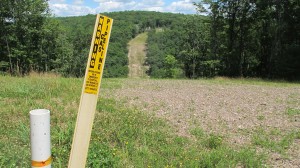PUC steps up efforts to advocate for pipeline safety

A marked interstate natural gas pipeline runs through Lycoming County. These lines are regulated by the federal government.
Public Utility Commission vice chairman John Coleman Jr. spoke about pipeline safety with Scott LaMar, host of WITF’s Smart Talk on Friday. Coleman praised StateImpact’s reporting on pipeline safety, and told LaMar that no one regulatory authority has a map of all the pipelines in the state. “Mapping of pipelines in Pennsylvania is an important priority,” said Coleman.
The federal government has authority over large, interstate pipelines. The PUC has authority over smaller pipelines that do not cross state boundaries. Some of these are called gathering lines, and feed the gas or oil from a well into the larger network of transmission lines. But in rural areas, known as “class one,” gathering pipelines fall into a regulatory black hole. Pipeline operators in those areas are required under Pennsylvania’s Act 127, to register with the PUC. But they only have to report the mileage totals for each county in which they operate. Since the state’s new pipeline law went into effect in 2012, operators have submitted records for about 13,000 miles of gathering lines. But because most of those lines are in rural areas, the PUC only has authority for regulating about 1100 miles, or about eight percent.
Coleman also published an op-ed detailing the efforts of the PUC to regulate the pipelines currently under its jurisdiction, and advocated for operators in rural areas to be required to register with PA One Call.
Lawmakers have introduced legislation to extend PA One Call registration to rural pipeline operators. But conventional oil and gas operators have opposed the effort, saying the risk and consequence of pipeline accidents in rural areas are low, and the costs of PA One Call are high.
















